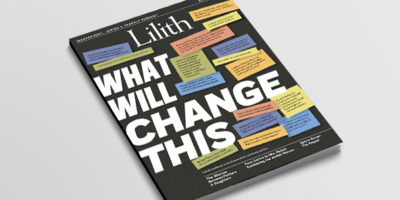Betraying the Bargain Not to Have Children
There’s a variety of Hollywood fantasy that’s delicious to visit every so often: beautiful white people to whom success comes effortlessly, living in perfectly appointed houses in bucolic towns. Money is never an issue. Love comes to the deserving, often in abundance. That everyone is talented and worthy of living this beautiful white-people life is never questioned.
What happens when someone who looks the part, but is far more complicated and prickly than her exterior would indicate, ends up in that story?
That’s the starting point for thinking about The Resurrection of Joan Ashby (Flatiron Books, $27.99), a big, bold novel by Cherise Wolas. Joan Ashby is a writing wunderkind whose first two books come out to universal acclaim and wild success before she hits the advanced age of 25.
Ashby is singularly focused on her writing. As a child she vowed never to allow any outside forces to pull her away from her calling. Until she is surprised by love, gets married and is then further surprised by an unplanned pregnancy.
The rest of the novel, which follows Ashby for over two more decades, starts at that moment, when her husband—a world-renowned eye surgeon, naturally—is, against the deal they had made never to have children, overjoyed.
Writers are a tricky bunch, and Ashby is no exception. Though she sees clearly into the future, in which her autonomy and ability to produce her art with the single-minded focus she needs will be imperiled, she says nothing. Her husband, high on his elation, doesn’t notice. The eye surgeon can’t see, and the writer can’t communicate.
Rather than engaging in a conversation with her spouse, she grapples with herself and decides to move into that future of wealthy, rural motherhood, complete with a lovingly tended garden, yoga classes and, ultimately, two sons. But she never forgets and she never forgives her husband for what becomes, in the story of her life, the first betrayal she suffers. The one that comes later is far worse, and sends the novel off in a new, not entirely successful direction.
Some readers will be gratified by the book’s embrace of the potential for the smoothly untroubled resolution that has been simmering below the surface all along. They’ll go along with Ashby as she embarks on a trip of spiritual tourism and finds peace with herself and her choices.
Others (and I am among them) will pine for the Ashby that could have been. In that version, the already thorny character would have gotten even spinier. She would have set off explosions. Instead, she learns to meditate.Still, the novel is too ambitious to ignore. Wolas’s own talent is undeniable. It’s even more impressive, considering that this is her first book. The novel is littered with stories-with-in-the-story: Ashby’s writing as a young superstar, exciting and unnerving in its own right, and the novel she begins after her world has been torn apart.
Although Ashby and her husband are emphatically “not anything,” ethnically speaking, and Ashby has to leave the U.S. for the novel even to include people of color, her characters often sport Jewish names. They are the representatives of a not-quite-forgotten foreignness who tie the story to an older identity, as well as calling attention to—and questioning—the fantasy of whiteness, wealth, and achievement that the surface of the novel insists upon.
At its heart, The Resurrection of Joan Ashby is an extended consideration of the role of motherhood in women’s lives. We watch Ashby struggle with the same elements so many of us face: her independent authentic voice and need to express it against the call and demands of raising and caring for her children. She defies the cultural imperative to romanticize motherhood: though she embraces her role, she internally favors one son over the other. She resents her children’s imposition on her time and imagination. As comfortable as her life is, she feels strangled by the choices she has made.
By the end, though, she is asking, “Is motherhood inescapably entwined in female life, a story every woman ends up telling, whether or not she sought or desired that bond; her nourishment, her caretaking, her love, needed by some-one standing before her, hands held out, demanding succor, commanding her not to look away, but to dig deep, give of herself unstintingly, offer up everything she can?
”Even those of us who have chosen that path have to answer “no.” Women are not all cut from the same nurturing cloth. That is as much of a fable as the Hollywood-worthy ending Ashby achieves. History has shown how dam-aging that understanding of women has been, too. So even though Wolas wants Ashby to have it all—motherhood and the wildly successful writing career—she ends up doing so on the back of the very notion that denied women their full, rounded humanity for centuries.
The Resurrection of Joan Ashby can’t maintain its fearlessness for its entire length, but for the first two-thirds of the novel, Ashby, like Jacob with the angel, wrestles with her life and identity. It is among the most thrilling prose I have read in a long time.
Michal Lemberger is the author of After Abel and Other Stories. She lives in Los Angeles.



